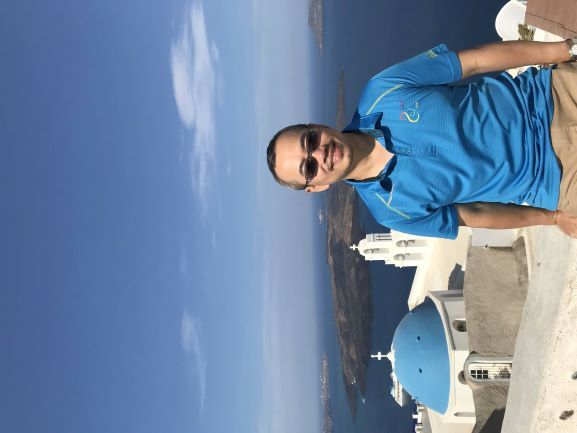Chih-Peng Chang, Ph.D.
|
張志鵬 |
Chih-Peng Chang, Ph.D. |
|
|
|
Tel (Office) |
886-6-235 3535 ext. 5643 |
|
Tel (Lab.) |
886-6-235 3535 ext. 5644 |
|
|
FAX |
(06) 208 2705 |
|
|
|
cpchang@mail.ncku.edu.tw |
|
|
Current position |
professor (2022.02-present) |
|
Education
year institution Status
1996~2000 Department of Medical Technology, B.S.
Kaohsiung Medical University, Kaohsiung, Taiwan
2000~2002 Department of Microbiology and Immunology, master training
National Cheng Kung University, Tainan, Taiwan
2002~2008 The Institute of Basic Medical Science, Ph.D.
National Cheng Kung University, Tainan, Taiwan
2008~2009 Military service in Army Lieutenant
2009~2011 Department of Microbiology and Immunology, Postdoctoral training
National Cheng Kung University, Tainan, Taiwan
2011~2013 Department of Microbiology and Immunology, Research Assistant Professor
2013~present National Cheng Kung University, Tainan, Taiwan Assistant Professor
Specialties
Immunology
Tumor immunology
Research interests
Autophagy is an evolutionarily conserved lysosome-dependent system in eukaryotes to regulate the turnover of cellular proteins and organelles. This self-eating system has been shown to control various cellular functions, including induction of cell death, immune activation, pathogen elimination and cancer generation. My research interests focus on the regulation role of autophagy in hepatoma-associated immunity and therapy application, and dengue virus infection, particularly in
1. The applications and mechanisms of lectins-induced autophagy in hepatoma therapy and chemoresistance
2. The role of autophagy in regulating hepatoma-associated macrophages functions and tumor immunity
3. The interactions of autophagy-related proteins and dengue viral proteins
PUBLICATIONS
1. Chen WY, Cheng YT, Lei HY, Chang CP, Wang CW, Chang MS*. IL-24 inhibits the growth of hepatoma cells in vivo. Genes Immun. 2005 ;6(6):493-499. (SCI)
2. Chang CP, Cheng WC, Lei HY*. A cellular ELISA to screen lectin-like compounds for cancer cell binding. Lett. Drug Design Discov. 2005; 2: 182-188. (SCI)
3. Chang CP, Yang MC, Liu HS, Lin YS, Lei HY*. Concanavalin A induces autophagy in hepatoma cells and has a therapeutic effect in a murine in situ hepatoma model. Hepatology. 2007 ;45(2):286-96. (Cover story, SCI)
4. Lei HY*, Chang CP. Induction of autophagy by concanavalin a and its application in anti-tumor therapy. Autophagy. 2007 ;3(4):402-4. (Cover story, SCI)
5. Chang CP, Lei HY*. Autophagy induction in T cell-independent acute hepatitis induced by concanavalin A in SCID/NOD mice. Int J Immunopathol Pharmacol. 2008 ;21(4):817-26. (SCI)
6. Lei HY*, Chang CP. Lectin of Concanavalin A as an anti-hepatoma therapeutic agent. J Biomed Sci. 2009 19;16:10. (SCI)
7. Yen MC, Lin CC, Chen YL, Huang SS, Yang HJ, Chang CP, Lei HY, Lai MD. A novel cancer therapy by skin delivery of indoleamine 2,3-dioxygenase siRNA. Clin Cancer Res. 2009 ;15(2):641-9. (SCI)
8. Yang MC, Chang CP, Lei HY*. Endothelial cells are damaged by autophagic induction before hepatocytes in Con A-induced acute hepatitis. Int Immunol. 2010 ;22(8):661-70. (SCI)
9. Yang MC, Chang CP, Lei HY*. Induction of liver fibrosis in a murine hepatoma model by thioacetamide is associated with enhanced tumor growth and suppressed antitumor immunity. Lab Invest. 2010 ;90(12):1782-93. (SCI)
10. Chang CP, Yang MC, Lei HY*. Concanavalin A/IFN-g triggers autophagy-related necrotic hepatocyte death through immunity-related GTPase family M member 1-mediated lysosomal membrane disruption. PLoS One. 2011;6(12):e28323. (SCI)
11. Chuang YC, Su WH, Lei HY, Lin YS, Liu HS, Chang CP, Yeh TM. Macrophage migration inhibitory factor induces autophagy via reactive oxygen species generation. PLoS One. 2012;7(5):e37613. (SCI)
12. Chang CP*, Su YC, Hu CW and Lei HY. TLR2-dependent selective autophagy regulates NF-κB lysosomal degradation in hepatoma-derived M2 macrophage differentiation. Cell Death Differ. 2013; 20(3):515-23. (SCI)
13. Chang CP*, Su YC, Lee PH, Lei HY. Targeting NFKB by autophagy to polarize hepatoma-associated macrophage differentiation. Autophagy. 2013; 9(4): 1–3. (SCI)
14. Chen MH, Li WS, Lue YS, Chu CL, Pan IH, Ko CH, Chen DY, Lin CH, Lin SH, Chang CP, Lin CC*. Clitocybe nuda Activates Dendritic Cells and Acts as a DNA Vaccine Adjuvant. Evid Based Complement Alternat Med 2013;2013:761454. (SCI)
15. Tai CH, Tsai YC, Wang CH, Ho TS, Chang CP*, Lee GB*. An integrated microfluidic platform for rapid detection and subtyping of influenza viruses from clinical samples. Microfluid Nanofluidics 2014, 16(3): 501-512. (SCI)
16. Hung LY, Chang JC, Tsai YC, Huang CC, Chang CP, Yeh CS, Lee GB. Magnetic nanoparticle-based immunoassay for rapid detection of influenza infections by using an integrated microfluidic system. Nanomedicine. 2014 ;10(4):819-29. (SCI)
17. Tsai TT, Chuang YJ, Lin YS, Chang CP, Wan SW, Lin SH, Chen CL, Lin CF. Antibody-dependent enhancement infection facilitates dengue virus-regulated signaling of IL-10 production in monocytes. PLoS Negl Trop Dis. 2014 ;20;8(11):e3320. (SCI)
18. Lee PH, Liu CM, Ho TS, Tsai YC, Lin CC, Wang YF, Chen YL, Yu CK, Wang SM, Liu CC, Shiau AL, Lei HY, Chang CP*. Enterovirus 71 virion-associated galectin-1 facilitates viral replication and stability. PLoS One. 2015 Feb 23;10(2):e0116278. (SCI)
19. Wan SW, Yang YW, Chu YT, Lin CF, Chang CP, Yeh TM, Anderson R, Lin YS*. Anti-dengue virus nonstructural protein 1 antibodies contribute to platelet phagocytosis by macrophages. Thromb Haemost. 2015 Dec 3;115(3). (SCI)
20. Lai YC, Chuang YC, Chang CP*, Yeh TM*. Macrophage migration inhibitory factor has a permissive role in concanavalin A-induced cell death of human hepatoma cells through autophagy. Cell Death Dis. 2015 Dec 3;6:e2008. (SCI)
21. Su YC, Davuluri GV, Chen CH, Shiau DC, Chen CC, Chen CL, Lin YS, Chang CP*.Galectin-1-Induced Autophagy Facilitates Cisplatin Resistance of Hepatocellular Carcinoma. PLoS One. 2016 Feb 9;11(2):e0148408. (SCI)
Awards
1. Award of great article in liver diseases provided by Liver Disease Prevention and Treatment Research Foundation, Taiwan, 2007
2. Award in research article in Medical College of National Cheng Kung University 2006











